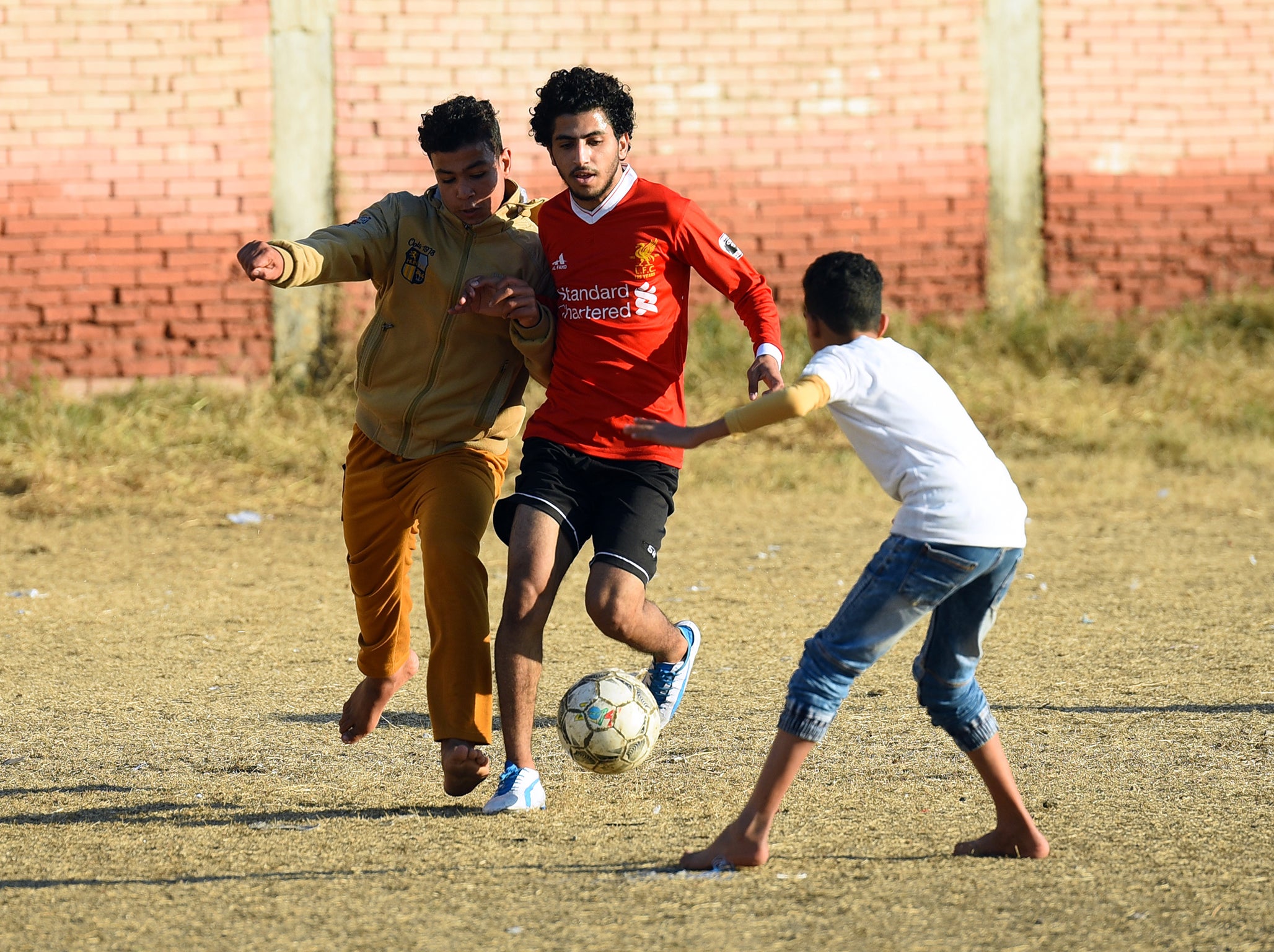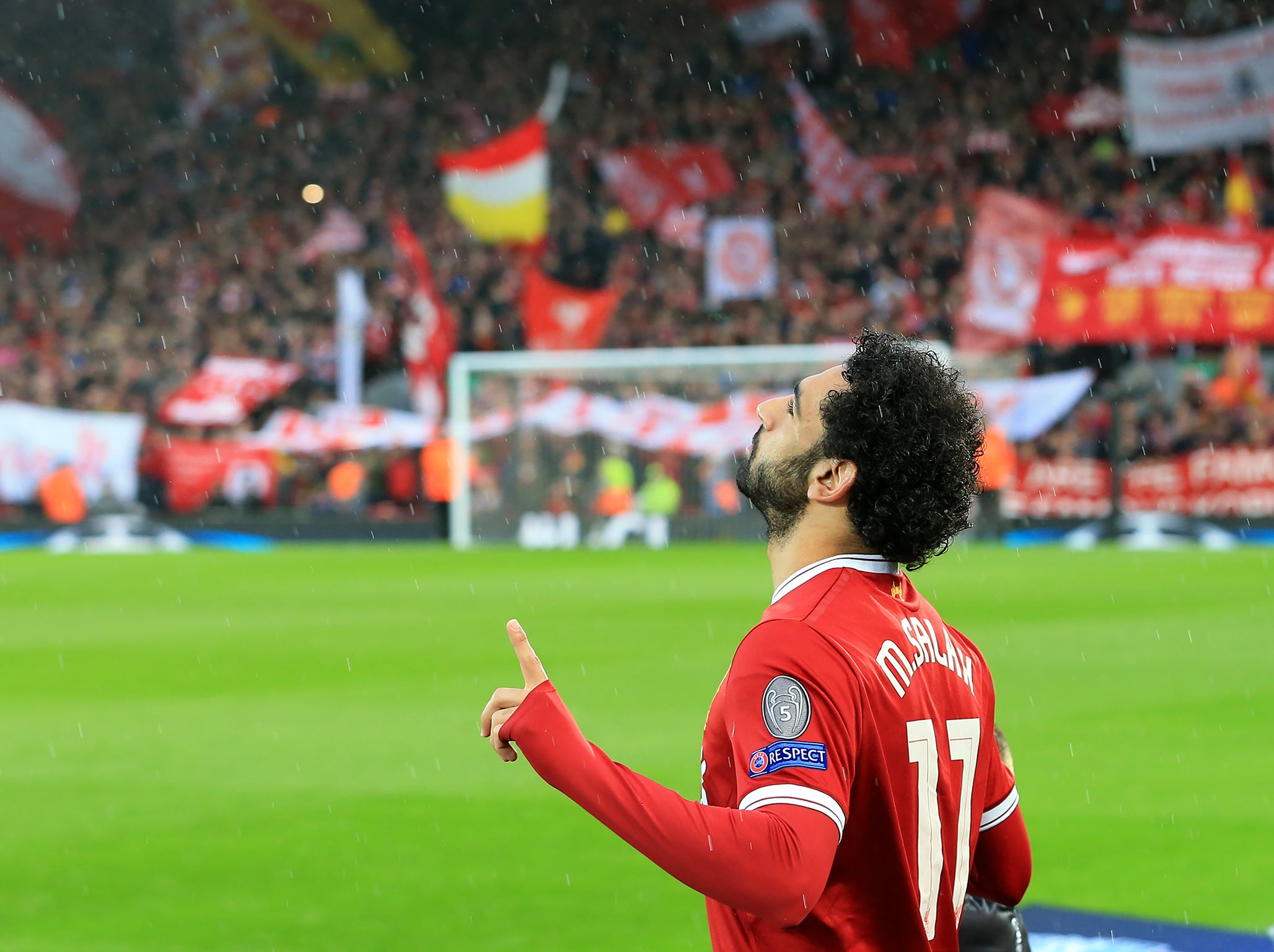What Mohamed Salah’s fairytale rise at Liverpool tells us about the simple, uplifting power of stories
This season the wider world has gradually become acquainted with Salah not merely as a footballer of note, but as a sort of cultural phenomenon

Your support helps us to tell the story
This election is still a dead heat, according to most polls. In a fight with such wafer-thin margins, we need reporters on the ground talking to the people Trump and Harris are courting. Your support allows us to keep sending journalists to the story.
The Independent is trusted by 27 million Americans from across the entire political spectrum every month. Unlike many other quality news outlets, we choose not to lock you out of our reporting and analysis with paywalls. But quality journalism must still be paid for.
Help us keep bring these critical stories to light. Your support makes all the difference.
Most football followers eventually get to an age where they finally, reluctantly, grasp the concept that followers of all other sports develop by instinct: that there are quite a lot of people out there who have little to no interest in sharing their all-consuming, lifelong passion. And so for most of an average week, the football obsessive - like any other sort of obsessive, really - exists largely in a bubble, populated almost exclusively by his or her fellow believers.
Every so often, though, the bubble gets pricked. And if even we are aware, on some rarefied, dislocated level, that Mohamed Salah is a Big Deal in a way that very few footballers are these days, there was still a vaguely startling sensation to seeing him on the BBC’s main Ten O’Clock News bulletin last night, alongside stories on the Grenfell Tower enquiry, the royal wedding, US sanctions on Iran - you know, proper news.
Yes, that’s the actual Fiona Bruce, talking about the actual Mo Salah, and by the way, pronouncing his surname to perfection, with the stress on the second syllable, but only just.
The story was a package from Salah’s home town of Nagrig in Egypt, and even without watching it you can probably picture it. All the usual tropes are checked: the woman walking down the street with a basket on her head, the beaten-up Daihatsu pick-up truck bearing pictures of Salah all over its fender, kids having a kickabout on a pitch girdled by decaying chain-link fencing. “From this sleepy town,” the reporter says, “Mohamed Salah has united Egyptians from all backgrounds, winning their hearts with his success on and off the pitch.”

You may, if you’ve been plugged into the grid, have noticed quite a lot of this stuff over recent weeks. Since the turn of the year, when it became clear that Salah’s debut season for Liverpool was going to be the sort of giddyingly iconic campaign that would be remembered for years to come, the wider world has gradually become acquainted with Salah not merely as a footballer of note, but as a sort of cultural phenomenon, a shared human experience, of which the goals and the accolades and the spotlit feature packages have been only a minor part.
Last week, the British Museum in London put Salah’s green football boots as part of its Modern Egypt exhibition. Over a million Egyptians reportedly voted for him in March’s presidential elections, despite the theoretical handicap of Salah not actually standing as a candidate. Streets and a youth centre have been named after him in Nagrig, where he has also paid for a dialysis machine, a sewage treatment plant, a school and a mosque.
Further afield, Saudi Arabia has awarded him a piece of land in Mecca, a recognition of his role as an inspiration to Muslims and Arabs all over the world. Somehow, Salah touches the places that modern football, with its interminable babble and exhaustive scope, often struggles to reach. All perfectly wonderful, of course, and almost entirely well-meaning, and yet - even given his spectacular feats this season - there’s still something about the runaway Salah bandwagon that feels weirdly, disorientingly novel.
Here’s my theory: those of us who engross ourselves in football on a daily basis - as writers and fans, as partisans and consumers - harbour a deep yearning for football to mean something bigger. Something that will justify the immoderate sums of our own money and time that we’ve expended in pursuit of it: the innumerable miles racked up, the myriad social engagements - up to and including the level of wedding - rearranged around the fixture calendar. It can’t just have been for a load of guys in tight-fitting tops running after a ball for 11 months of the year. Surely there was more to it than that.
The trouble is, when football does represent something larger, it tends to be as a reflection of our own corrupted human nature. Deception and greed. Hypocrisy and rage. BT Sport’s Donald Trump adverts. Players clearly taking corners from outside the quadrant. Venality and incompetence. Racism and sexism. Deep down, burrowed in the heart of this impure game, we want to believe that one pure thing resides in it.

And so, into the chasm between credulity and cynicism: enter Mo Salah. Building cultural bridges. Harmonising people from different faiths and backgrounds. Mending the social fabric. Uniting an entire people in the act of adulation. These are not, by and large, impulses that the sport’s collective muscle memory is terribly familiar with. Even as we near the Champions League final and the World Cup, making our final approach into peak Salah, the idea of football as a genuinely benevolent influence - not a game, or a business, or a confected radio phone-in debate, or a branding opportunity - remains deeply surreal. Football? As a force for good, you say? You’re new here, aren’t you?
There’s a problem here, of course. It’s not actually going to happen. Salah may well continue to score goals by the hundred, fill the vacuum created by over the next few years by a declining Messi and a receding Ronaldo, even put up a school or two. But he can’t possibly live up to our expectations of him, because those expectations have already been pitched at a level beyond his reach. Salah will have his faults. He will have bad games, perhaps even bad seasons. He will do stupid things, because he’s a person, and that’s what people do. And when he does, you can only hope that football’s reactionary reflex, its determination to find fault, to taint and tarnish, retains a certain perspective.
Which doesn’t make any of the current Salah worship any less valid or sincere, of course. Just as long as we know exactly what’s going on here. The Champions League final between Liverpool and Real Madrid is already being conceptualised as ‘plucky underdog with the all-conquering working-class hero’ against ‘evil empire with a player who named his son Cristiano Jr’, largely ignoring the alternative billing in which ‘supporter-owned co-operative with a strong home-grown element and a club legend in charge’ takes on ‘foreign-owned team bought by American hedge fund money’.
But, you know, whatever helps sell tickets. And to see the veneration and enthusiasm that Salah has inspired over recent months is to be reminded of the simple, uplifting power of stories. “When I see him playing, I feel it’s me playing,” says one of the kids on the BBC News report, maybe about eight or nine years old. “I feel grateful that Salah is from our town.”
One day, no doubt, he’ll learn that the gods are mortal, that heroes are human, that football, like life, doesn’t fit into neat parables of good and evil. But you hope it's not for a while.
Join our commenting forum
Join thought-provoking conversations, follow other Independent readers and see their replies
Comments